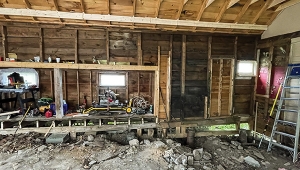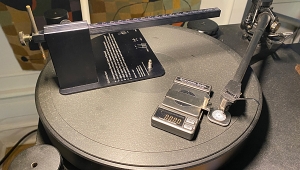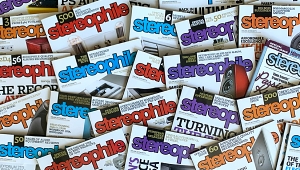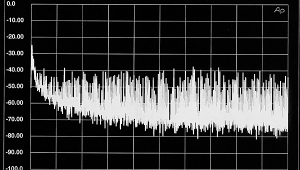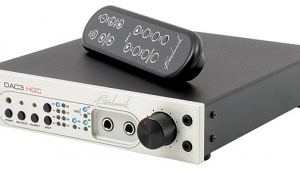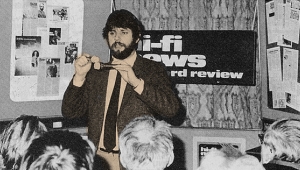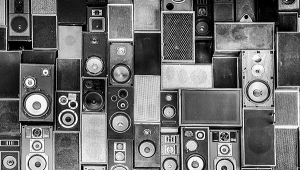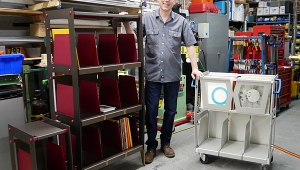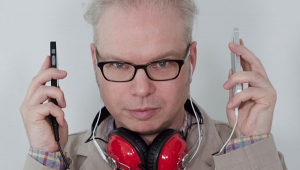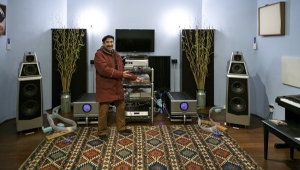| Columns Retired Columns & Blogs |
Lights in a Box? Letters page 2
Immediate Attention
Editor:
It's just past midnight, I haven't yet finished my newest copy of Stereophile and I'm writing because the Steve Guttenberg/Joel Silver articles on Home Theater demand immediate attention. Mr. Guttenberg eloquently expresses an opinion that the mere existence of surround-sound will detract from appreciation of really great music, and is an affront to a true audiophile. I am not an audiophile. I am, instead, a fairly knowledgeable, fairly discriminating, middle-aged man who happens to love music. I earn my daily bread as a Sales Associate (Home Audio Department) for a middle-sized chain electronics retailer. Most of my customers are not audiophiles. They are, almost without exception, people with a passion for music who have never heard really good recorded music---people whose souls yearn for hi-fi while their wallets struggle to achieve mid-fi levels, if you will.
Editor:
It's just past midnight, I haven't yet finished my newest copy of Stereophile and I'm writing because the Steve Guttenberg/Joel Silver articles on Home Theater demand immediate attention. Mr. Guttenberg eloquently expresses an opinion that the mere existence of surround-sound will detract from appreciation of really great music, and is an affront to a true audiophile. I am not an audiophile. I am, instead, a fairly knowledgeable, fairly discriminating, middle-aged man who happens to love music. I earn my daily bread as a Sales Associate (Home Audio Department) for a middle-sized chain electronics retailer. Most of my customers are not audiophiles. They are, almost without exception, people with a passion for music who have never heard really good recorded music---people whose souls yearn for hi-fi while their wallets struggle to achieve mid-fi levels, if you will.
Home Theater, as it exists today, does not produce the best music possible. So what? By definition, only one system I (or any critical reviewer) have ever auditioned was the best. All others were less. This simple fact does not stop me (or any critical reviewer) from appreciating the merits of those other, lesser systems. Proof of my assertion is contained in Stereophile's "Recommended Components."
Often, my customers suffer from the same educational blight Mr. Guttenberg correctly decries: excessive bass used to mask harsh treble and missing midrange. They can't help it, no one ever told them that "loud" isn't necessarily good, or that recorded music should ideally sound just like a live performance. Yet my customers know---at some intrinsic level---that the music and sound they live with daily just isn't right. How else explain a population that has produced street music the likes of Philadelphia acappella harmony, delta blues, or New Orleans jazz? Especially given the immediate desire to possess almost any new equipment promising more, and better, music than ever before?
For most, a move into Home Theater is a move into better sound (admittedly mid-fi) than they have ever before heard. They spend hours and hours agonizing between Fisher and Kenwood. Their decisions are most often based on what their parents, or their friends, bought. They believe Sony invented CD technology and that any three-way speaker makes better sound than any two-way speaker, regardless of cost. But they listen when I demonstrate our premium brands. It's part of the courtship ritual. Most don't really believe better sound is possible. Many are simply too conservative to do so, even when they hear the differences. They often think my demonstrations are faked, using special recordings. In fact, the most-often-heard objections I have to overcome are: 1) Only the speakers make a difference anyway; 2) It's good enough for me; and 3) It's too expensive. But when they hear the differences they like the differences, and sometimes they buy the differences. When they do, I've done a good job---and made another convert.
Please note that each of the above objections totally ignores the improved sound available through modern technology. I believe stereo has become so commonplace that it has joined the telephone. The common attitude is, "Everyone has one and they all do the same job." People have forgotten that music is a luxury, that good recorded music is a recent invention, that stereo is both a toy and a hobby. We in the industry must counteract this belief. We must convince the public that, just like golf, skiing, fishing, and hang-gliding, those with better toys do it better; and we must prove it, one listener at a time.
Home Theater is another arena, another tool, to show skeptics the differences between lo-fi and mid-fi. During demonstrations I frequently tell customers that I can sell them good sound or I can sell them cheap sound, but I can't sell them good cheap sound. Then I have to convince them they deserve the sound they like. Once I have established trust in the listener's own ears, then is the time to move to the differences between mid-fi and hi-fi.
Home Theater creates its own market. Dolby Pro Logic is the hottest thing in sound. Nearly everybody who hears surround-sound wants surround-sound. I believe this is a Good Thing for Audio. The sound is far more natural than anything ever to come out of a television set, and the step from a more "realistic" gunshot or explosion to more realistic "music" is a small step. THX standards, in particular, offer an avenue to move customers away from the classic "more bass is better" mindset, simply because most people can't afford two separate systems. Once an appreciation for natural movie sound is instilled, better musical performance must follow. Granted, music played on an average THX system is a far cry from a live orchestra performing in the Royal Albert Hall, but it is more accurate and realistic within its limitations than the typical booming bass, slurred mids, or screeching treble of the average mass-market system. Home Theater is single-handedly producing consumer interest in better, more natural sound during an age of overproduced electronic garbage, and it is generating the money necessary to attract large amounts of industry attention.
Bad cinema sound caught George Lucas's attention, and the resultant THX certification program caused sweeping reforms in the way movie sound is produced and played. I think it's time for each of us in the industry, at whatever level, to refocus our attention---on directing the attention (and money) into what sound can be, should be, rather than simply complaining about what Home Theater isn't.-
--Gary Smith, El Cerrito, CA
Music Or Non-music
Editor:
I find it no coincidence that at least one member of the high-end community feels that Home Theater will be the death knell of the high-end audio industry (Steve Guttenberg, "Lights in a Box," Vol.19 No.1). After all, one of the primary reasons for the fascination with Home Theater is the completely enveloping sound seeming to come from everywhere and nowhere, the loudspeakers disappearing. And who has promoted the idea that this is so good? Why, you have, your writers have, and virtually all of the high-end press has joined in.
How have you promoted the idea? By constantly stressing non-musical sonic attributes. Virtually all your articles leave the reproduction of the art of music as the poor cousin of sonic nirvana. You throw musical softballs at all the components you test, failing to discover if the system can even play all the notes. Want a good test? Try "What a Time" from Bruce Hornsby's Harbor Lights album (RCA 66114-2). The electric bass is running some long lines of sixteenth notes that I have heard reproduced cleanly. Would it surprise you to know that at least 90% of your "Recommended Components" will smear this bass line into mush that is unrecognizable and unfollowable?
One article, also in Vol.19 No.1, by Robert Harley, reviewing the MIT/Avalon/Spectral system, sums up exactly where you and your writers attach maximum importance. Here are some excerpts from consecutive paragraphs under the subhead "Music": "soundstage that was considerably different..."; "went from sounding terrific to sounding utterly spectacular..."; "The system threw a gigantic three-dimensional soundstage..."; "The soundstage's ability to extend up..."; "the system projected images..."; "system projected some of the percussion..."; "images thrown directly between the loudspeakers..."; "extraordinary imaging..."; "image locations and image size..."; "stunning spatial presentation..."; "remarkable soundstaging..."; "amazing soundstaging..."; "detailed description of the soundstage..."; "unique soundstaging..."
Is it any wonder that people are beginning to question the need to spend big bucks on a high-end system when a couple grands' worth of Sony/Bose surround will get them into that disappearing-speaker stuff? Try challenging the stuff you review. High-end audio should be distributed in a bell curve. You've got it looking like a graph of the Dow.
---Parker King, The King's Stereo, Indianapolis, IN
- Log in or register to post comments
